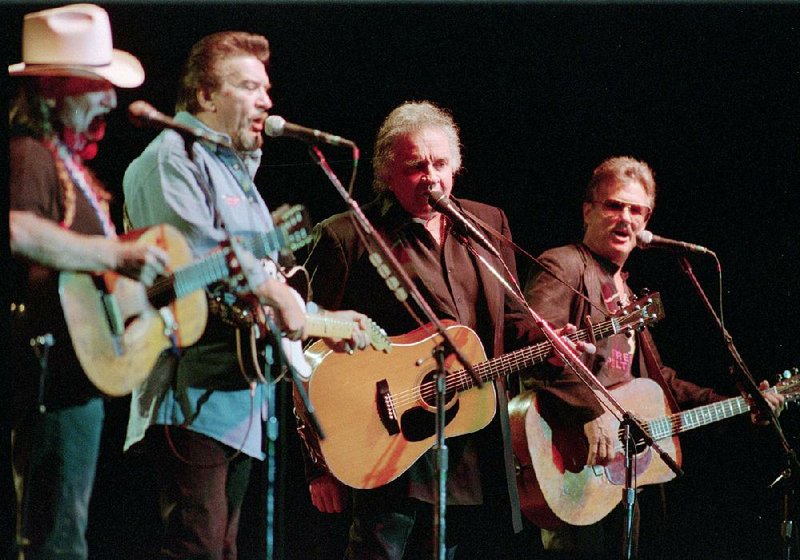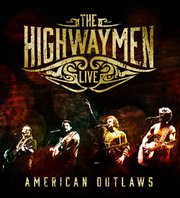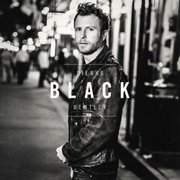I saw The Highwaymen -- the country supergroup made up of Johnny Cash, Willie Nelson, Waylon Jennings and Kris Kristofferson (and a crack band of session musicians) -- perform a couple of times in the late '80s and early '90s. And I don't want to sugarcoat it; those shows were pretty terrible.
By terrible, I don't mean sloppily performed or that the material was sub par. It felt like one of those thoroughly inauthentic experiences that concert events sometimes turn out to be. The shows existed to allow these legends a chance to cash in on their remarkable catalogs in a way that didn't tax them overmuch. They existed so fans could see the four icons together on one stage. It was a kind of living Mount Rushmore of a certain kind of country music -- the sort that is never quite so popular as critics would like it to be.
But the music delivered in these shows -- and compiled in the recently released The Highwaymen Live -- American Outlaws (Columbia/Legacy), a three-CD/one DVD boxed set that captures the band onstage, chiefly during a 1990 show on New York's Long Island -- never seemed as adventurous or raw as any of the frontmen's solo work. It felt, at the time and in reprise, closer to a variety show or Las Vegas revue than whatever it was that I expected.
I remember being weirdly disappointed, although I had been to enough shows to understand that it's difficult to be spontaneous or intimate when you're trying to connect with thousands of people, some of whom only know your biggest hits. I get this now, and maybe I got it then -- I only went to The Highwaymen shows for professional reasons. I wouldn't have bought a ticket, though I would have paid to see any of the individual performers.
Still, I remember thinking it strange that these artists I so admired were willingly complicit in what struck me as show biz kitsch. They traded verses of some of their most enduring songs, songs that had been over-arranged and slickened for the occasion. I remember how the backing musicians were able to make "Mystery Train" -- the show's instrumental overture -- sound like a game show theme.
Still, it was a well-played game show theme that featured a glistening pedal steel lead by Robby Turner, a player who in some circles commands the same sort of respect as the famous frontmen. The son of Doyle and Bernice Turner, who played steel guitar and rhythm guitar, respectively, in Hank Williams' Drifting Cowboys in the 1940s, Robby Turner was playing drums and touring with the Wilburn Brothers. As an 11-year-old he was playing three nights a week in a Paragould honky tonk. In 1976, when he was 14, he joined Ace Cannon's band as a steel player and later produced three of the sax player's albums. He worked with Charlie Rich, Rufus Thomas, Jerry Lee Lewis and the Gin Blossoms as well as Don Was and Herbie Hancock. Last year he played on Chris Stapleton's Traveller.
All of the backing musicians producer Chip Moman (who died last week at the age of 79) assembled for The Highwaymen shows were session monsters. Most had worked with Moman as part of the Memphis Boys, American Sound Studio's house band that played on recordings as diverse as Joe Tex's "I Gotcha," Merrilee Rush's "Angel of the Morning," Neil Diamond's "Sweet Caroline," The Box Tops' "Cry Like a Baby," Elvis Presley's "In the Ghetto" and Danny O'Keefe's "Goodtime Charlie's Got the Blues."
Drummer Gene Chrisman, bassist Mike Leech, guitarist Reggie Young, keyboardists Bobby Emmons and Bobby Wood had all served in the Memphis Boys. They were augmented by guitarist J.R. Cobb, who had worked with Roy Orbison and (as a member of the Classics IV) written the hit "Spooky" (which he later re-recorded as a member of the Atlanta Rhythm Section) along with keyboardist Danny Timms and Nelson's harmonica player Mickey Raphael. Timms and Wood also provided backing vocals.
Additionally, each of the frontmen made a show of playing guitar -- Jennings held his trademark leather-girded Telecaster, Cash strummed a big Guild dreadnought, Kristofferson alternated between a Stratocaster and an acoustic 12-string. There were a lot of instruments and voices competing for room up on that stage, and a lot of the songs weren't well served by the show band treatment. Kristofferson's material seemed especially vulnerable to being smothered in the mix -- "Help Me Make It Through the Night" was given a particularly schmaltzy reading, with an ascending keyboard figure crowding in between the lines of the verses, turning what had been a plaintive grown-up bid for transitory affection into another peppy pop number.
Still, the set list was formidable -- a lineup of greatest hits (among them "Mammas Don't Let Your Babies Grow Up to Be Cowboys," "Good Hearted Woman" and "Luckenbach, Texas" that had been recorded by Jennings and Nelson; Nelson's "Blue Eyes Crying in the Rain" and "On the Road Again"; Cash's "Ring of Fire," "Folsom Prison Blues," "Big River" and "A Boy Named Sue"; and a slew of Kristofferson songs) peppered with tunes from Highwaymen records that provided the tours with a reason for existing beyond the novelty of seeing an all-star old-timer's game.
The most interesting of these, Jimmy Webb's "Highwayman," an existential story about how the rebel spirit survives the death of the rebel, was the title track of the 1985 album that brought the four icons together. That album, as well as its 1990 sequel, was officially credited to "Nelson, Jennings, Cash, Kristofferson," rather than "The Highwaymen."
The boxed set replicates pretty faithfully what I remember, and the performances feel comfortable and relaxed, with none of the stars evincing much more than professional charm. What's most impressive about the performances is the checked power of the band, which feels like it might break off the stage and roar away at any moment.
There are a few highlights -- their version of Guy Clark's "Desperadoes Waiting for a Train" feels more poignant now that Jennings, Cash and the song's writer, the inimitable Guy Clark, are all gone. And Kristofferson's "The Pilgrim: Chapter 33" benefits from the context -- it was allegedly written about a stumbling Johnny Cash. When Cash comes in on the second half of the first verse (accompanied with a walking bass line), it's hard not to feel something. You can hear Kristofferson chuckle, and believe that at least the friendships are genuine.
It is marvelous that this sort of show ever existed, that you could buy a ticket and see these guys together on one stage, trading verses and lines and smiling for the fans. You can tell they're enjoying themselves, though the excellent liner notes by Mikal Gilmore (I hesitate to say they justify the cost of the set, but they're the most interesting thing in the package) indicate that there was at least a little backstage tension between the politically outspoken (and left-leaning) Kristofferson and Jennings, who objected to Kristofferson's occasional speechifying on the subject of the first Iraq war. But not on political grounds exactly.
"We came pretty close to punching it out," Gilmore quotes Jennings as saying. "I didn't say he was all wrong. Main thing I was saying was he shouldn't be doing it onstage with three other people who didn't share all of his thoughts."
I don't remember any political fireworks at the shows I attended. That might have made them more memorable.
...
My problem with a lot of purported country music has always been that there's a tension between what I believe it ought to be -- folk music about the lives of common people sung in plain voices -- and what can be sold to a mass audience. The Highwaymen were not my idea of how the music of Cash, Kristofferson, Jennings and Nelson ought to be presented. I would have preferred something less baroque and more subtle. But the truth is, when you're playing a big house, you have to play to the 50th row. Any time country music becomes really popular it becomes show business. You make a record, you make a compromise. You think Hank Williams hung out in Nudie suits when he was off duty?
Some people might be predisposed to dislike an artist like Dierks Bentley because Jason Isbell claims he stole a melody from him or because he just looks -- and used to sound -- like another one of those bro-country manques. Whatever. His new album Black (Capitol Nashville) is at least a stab at making a country record that reflects something like the way ordinary people live and court affection in the modern world. While it brings in divisive noises -- there are hip-hop elements in the sultry "Somewhere on a Beach" and Trombone Shorty shows up on "Mardi Gras," which plays as a nod to his party boy past -- for the most part it relies on old-school musicality.
While it's not a writer's album -- or maybe it is, since 23 writers account for the 13 songs (Bentley has a co-writer credit on seven of them) -- it does suggest a more mature and serious approach, as Bentley and producer Ross Copperman demonstrate they know how to make a record. Particularly enjoyable are Bentley's duets with Maren Morris ("I'll Be the Moon") and Elle King ("Different for Girls").
It's not really country music -- it's not what I call country music -- but it's not bad stuff either. And while it still feels a little anonymous and 21st-century streamlined, one senses an honest effort underneath. I'm inclined to compare Bentley to the actor Channing Tatum, a pretty face who understands exactly how far he has to go to be really good. But he wants to be really good. Maybe he's not yet. But he's trying.
And that's so much more than you can say for so many others.
Email:
pmartin@arkansasonline.com
blooddirtangels.com
Style on 06/19/2016


